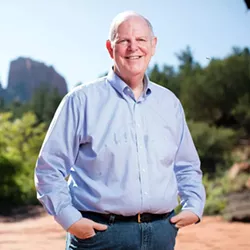Tuesday, October 6, 2020
O'Halleran, Democrats Keep Campaign Focus on Health Care Issues

The healthcare advocacy organization Protect Our Care took a “virtual bus stop” in Arizona on Tuesday to advocate for protecting the Affordable Care Act and to bring awareness to Republican-led efforts to dismantle it.
The group usually tours the nation on a physical bus, but this year, they’re hosting virtual meetings with elected leaders and health care advocates throughout 16 states to discuss present dangers to Americans’ access to healthcare and how this is complicated by the coronavirus pandemic.
Democratic Rep. Tom O’Halleran kicked off the presentation of live speakers. He told a story about one of the first bills he tried to pass in Congress that addressed the coverage gap in Medicare drug plans. When he went to present his bill, the chairman of the rules committee set four large piles of paper on the front desk — the four healthcare plans the committee had already written since 2012.
Now, O’Halleran supports the Obama-era healthcare plan and believes “people really count on the ACA,” and that getting rid of it without a clear replacement could mean further digression in healthcare and put 300,000 Arizonans with pre-existing conditions at risk.
“These are costly issues that involve life or death situations for many people,” O’Halleran said. “This is not about moving America forward, but moving America backward. If you’re going to go after [the ACA], have a better plan, or at least have a plan. And they don’t have any of that.”
As the Democratic nominee for Congress in District 6 and a former emergency room doctor, Hiral Tipirneni also discussed the importance of keeping the ACA, and the health insurance it brought 20 million people, intact.
“I’m running for Congress because of this issue of healthcare,” Tipirneni said. “In our country, we have absolutely failed in achieving that goal of quality, affordable healthcare for every American.”
During a global pandemic that’s killed more than 200,000 Americans, Tipirneni says protecting the ACA is more important than ever.
“Here we are in one of our nation’s darkest and most difficult moments, and we’re trying to fight an administration that is literally trying to take away the remaining safety net that is there for millions of families across this nation,” Tipirneni said.
Kristin Urquiza is a co-founder of a new organization called Marked by COVID that works with families who have lost loved ones to COVID-19. She started the group after her father died from coronavirus in June.
Urquiza says protecting the ACA is fundamental to establishing a “basis of care” for coronavirus survivors because the long-term healthcare complications of the virus, many of which are unknown, could be classified as pre-existing conditions. The ACA currently prevents health insurance companies from refusing coverage based on a pre-existing condition.
“If the ACA is abolished, we’re entering into dangerous territory that could mean COVID survivors are labeled as having a pre-existing condition,” Urquiza said. “Part of the thing that terrifies me, as well as so many people that I talk to, is wondering whether or not there is going to be a long-term health implication they’re not going to be able to afford.”
According to Tipirneni, the unknown consequences of COVID-19 could be used by private insurance providers to deny care.
“What we don’t know is what the longstanding consequences will be,” Tipirneni said. “[Insurance companies] can literally try to draw a line from anything and say, ‘Well we don’t know that this isn’t from COVID, so this is a pre-existing condition.’ This is a historical practice of insurance companies.”
At the virtual meeting, speakers also discussed how people of color are disproportionately impacted by the virus — an issue that could be compounded if the ACA is dismantled.
Lydia Guzman, the director of advocacy and civic engagement for Chicanos Por La Causa, a local nonprofit that advocates for underserved communities, said although nonprofit organizations like hers can provide some funds for things like rental assistance, they can’t be a source of medical insurance.
“It’s no secret that the zip codes that are most impacted by the pandemic are the zip codes where our Latino families are living,” Guzman said. “If it weren’t for the ACA, many of them would not be able to continue to have coverage.”
Zaida Dedolph, the director of health policy at Children’s Action Alliance, said the ACA has increased the number of Latino and Native American children with health insurance in Arizona, and that cuts to the access the ACA provides is “a direct threat to children and families of color” in the state.
According to Dedolph, the ACA provided new pathways to affordable healthcare for children that allow them to receive preventative care before worsening in condition and are therefore more likely to graduate and earn more money as adults.
“Funding programs that keep children connected to healthcare coverage is an investment in public health and social justice,” Dedolph said.
All of Protect Our Care’s guest speakers agreed that when it comes to preserving the ACA — especially as its existence is threatened in the Supreme Court — the situation could not be more dire.
“On the crust of a global pandemic, with the fate of the Affordable Care Act in limbo, the lives of hardworking American families are hanging by a thread,” Dedolph said. “For our kids, for our health and for our future, it’s more important than ever that Congress and our state policymakers act to protect our care.”













